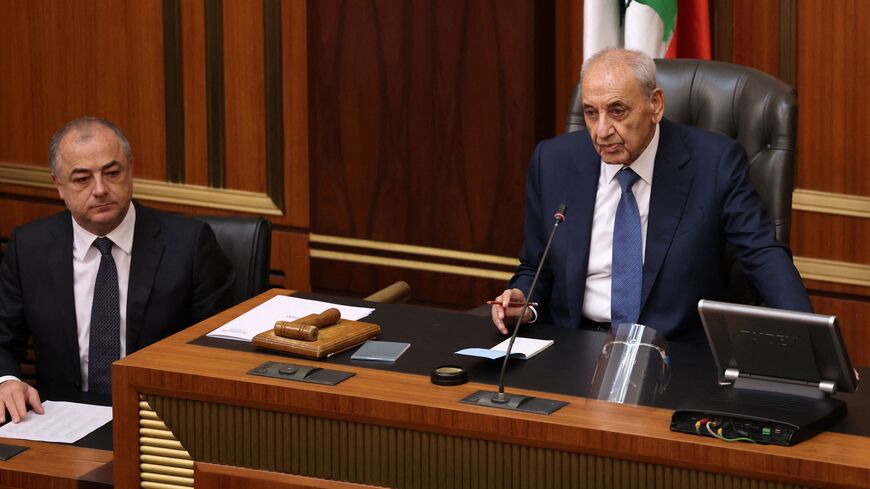BEIRUT – The end of 2022 is one of paralysis and dysfunction in Beirut, as Lebanon’s parliament fails for the tenth time to elect a new president, even as the head of the Lebanese army Joseph Aoun emerges as potential contender.
By the end of former President Michel Aoun's term last October, fears mounted of a political void which has since only amplified people's daily struggles and the financial crisis that has brought the country to its knees since 2019.
At the parliament's last session two weeks ago, the chamber with its 128 members failed for the tenth time to vote for a new president and no date has set for the next meeting. There is currently no consensus among the parliamentarians around any of the candidates, but few leading names have emerged for the opposing political blocs. The Lebanese constitution requires majority of two-thirds of the members of the Parliament (85) is required to elect the president in the first round. In the second round, a President can be elected by a simple majority of 65 deputies.
During the last session, Suleiman Franjieh, the leader of the Marada Movement - an ally of Hezbollah and Syrian President Bashar Al-Assad, got 1 vote but this was the first time his name makes it to the ballot. Prime Minister Najib Mikati has publicly endorsed Franjieh. His nemesis Michel Moawad, an anti-Hezbollah figure, took 43 votes but is seen as unacceptable by Lebanese juggernaut armed group.
Army commander General Joseph Aoun's name has emerged behind the scenes possible consensus candidate, though he is not official on the ballot. The head of the Lebanese Forces party, Samir Geagea, told Okaz newspaper this month that “there is no veto” on Gen. Aoun.
Lebanese media reports in Al-Akhbar and Nahar newspapers have indicated that France and the US are open to Gen. Aoun's candidacy. Publicly, US officials have shied away from backing a name. If Gen. Aoun wins the vote it would be the fourth time that Lebanon has elected presidents with military backgrounds since Fouad Chehab in 1958, mainly Emile Lahoud (1998-2007), Michel Sulieman (2008-2014) and Michel Aoun (2016-2022). But such move requires a vote on a constitutional amendment, since the Lebanese constitution does not allow for a presidential candidate to also be an operational army officer.
Ramzi Dassoum, the official in charge of public relations in the Free Patriotic Movement (Michel Aoun's party) told Al-Monitor that his party objects to an amendment.
"On the personal level, we do not have a problem with the army commander... But as a party, we are against amending the constitution.”
To facilitate the election of the army commander the constitution was amended twice in 1998 and 2008, while Aoun's election didn't require such amendment because he was outside the military corps for 26 years.
This will not be the first time the country has had a presidential vacuum. Aoun was elected in 2016 after two and a half years of political deadlock. He completed his six years while prime minister-designate Najib Mikati heads a caretaker government.
Many parliamentarians are pessimistic about the process.
“I’m not sure if we will have a president next year. The vacuum seems to be the best candidate for the political class,” independent MP Paula Yacoubian told Al-Monitor.
“They want a president who opposes reform and accountability. ... What matters to them is staying in power,” she added.
Patrick Richa, head of the media and communication department of the Phalange party, told Al-Monitor alluded that the keys to a solution are with Hezbollah.
“We can’t know if a president will be elected ... but Hezbollah has been dominating the country since 2015, in governments, electoral law, chamber of deputies and presidency of the republic. The ball is now in its court.”
Analysts are concerned that the powerful Shiite groups Hezbollah and Amal hold the key to the election because they have (with their allies) the most deputies in parliament. Nevertheless, Hezbollah has yet to declare its support for anyone.
Hezbollah's media relations officer Rana Sahle, told Al-Monitor, that there has been no decision about the issue.
A US-French-Saudi-Qatari meeting is being planned in Paris to discuss the presidential election, as Faysal Sayegh, a member of the Lebanese Parliament told Al-Monitor. The date has yet to be confirmed but he expected it in February given the risk that a continued void would bring on the economic situation.
Another name that has been floating is Ziad Baroud's, an independent figure, a lawyer and former minister of interior and municipalities (2008-2011). Independent parliamentarian Elias Jradi told Al-Monitor that he expects Ziad Baroud to be the new head of state but did not explain his reasoning.
Deputy speaker of the house Elias Bou Saab has in fact voted for Baroud in what seems to be an attempt to push his name as a consensus candidate.
Since Lebanon’s independence from France in 1943, the president has had to be a Catholic Maronite, the prime minister a Sunni and the speaker of the house a Shiite. However, the Christian community is more politically divided than others in Lebanon, giving rise to a slew of presidential candidates.
Lebanon has been battling a severe economic crisis since the end of 2019, plunging 80% of the population below the poverty line. Institutional paralysis is further delaying a possible IMF deal to help the country’s economy recover.







